外研版高中英语必修一单词Module 2详解
外研版必修一module2知识点课件

The impact of the internet on society and individuals
Learning Objectives
01
02
03
04
To understand the basic concepts of the internet and the World Wide Web
03
Grammar and Vocabulary
Grammar Rules and Forms
1 2
名词复数形式
掌握名词复数形式的构成规则,如规则变化和不 规则变化。
动词时态
熟悉并掌握常用的动词时态,如现在时、过去时 和将来时。
3
形容词和副词的比较级和最高级
了解形容词和副词的比较级是如何构成的,以及 最高级的构成和用法。
grammar, and punctuation.
Proofreading
Checking for errors and inconsistencies in the text.
Applying Reading and Writing Skills to Texts
Text Analysis
Analyzing the content, structure, and language of a text.
外研版必修一module2知识点课件
目录
• Module Introduction • Language and Culture • Grammar and Vocabulary • Reading and Writing Skills • Listening and Speaking Skills • Integration of Language Skills
外研版高一英语必修1_Module2_核心词汇精讲
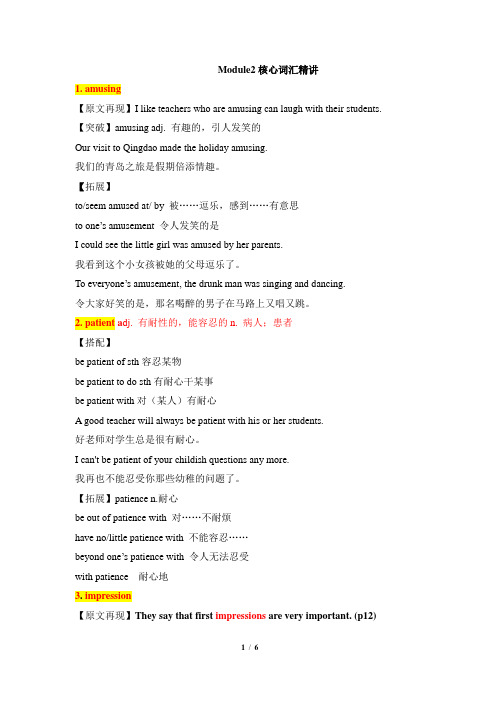
Module2核心词汇精讲1. amusing【原文再现】I like teachers who are amusing can laugh with their students. 【突破】amusing adj. 有趣的,引人发笑的Our visit to Qingdao made the holiday amusing.我们的青岛之旅是假期倍添情趣。
【拓展】to/seem amused at/ by 被……逗乐,感到……有意思to one’s amusement 令人发笑的是I could see the little girl was amused by her parents.我看到这个小女孩被她的父母逗乐了。
To everyone’s amusement, the drunk man was singing and dancing.令大家好笑的是,那名喝醉的男子在马路上又唱又跳。
2. patient a dj. 有耐性的,能容忍的n. 病人;患者【搭配】be patient of sth容忍某物be patient to do sth有耐心干某事be patient with对(某人)有耐心A good teacher will always be patient with his or her students.好老师对学生总是很有耐心。
I can't be patient of your childish questions any more.我再也不能忍受你那些幼稚的问题了。
【拓展】patience n.耐心be out of patience with 对……不耐烦have no/little patience with 不能容忍……beyond one’s patience with 令人无法忍受with patience 耐心地3. impression【原文再现】They say that first impressions are very important. (p12)【突破】impression n. 印象。
外研版必修一module2单词详解学案

SH1 Module2一、amusing adj. 有趣的,好玩的;引人发笑的v. 逗乐;打发;使…高兴(amuse 的ing式)词根: amuseadj.amused 愉快的,顽皮的;被逗乐的amusive 愉快的;有趣的adv.amusingly 有趣地;好笑地n.amusement 消遣,娱乐;乐趣v.amused 逗笑(amuse的过去分词);使欢乐vt.amuse 娱乐;消遣;使发笑;使愉快amuse oneself 自娱自乐,消遣二、energetic adj. 精力充沛的;踊跃的;有力的词根: energyadv.energetically 踊跃地;精力充沛地n.energy [物] 能量;精力;活力;精神vt.energise 供给…能量;使精力充沛(等于energize)同近义词:adj. 精力充沛的;踊跃的;有力的active , positive , male , live , vigorous 辨析: lively, brisk, active, vigorous, energetic这组词都有“踊跃的,活跃的”的意思,其区别是:lively 偏重支轮船快,机智,有生气。
brisk 指动作敏捷、充满活力、轻快活泼地从事某项工作或活动。
active 指有活动能力,强调与消极或停止相反的踊跃活动状态。
vigorous 指不仅表现踊跃、有生气,而且固有精力和活力十分旺盛。
energetic 提精力充沛、奋力从事某事业。
3、nervous adj. 神经的;紧张不安的;强健有力的词根: nerveadj.nervy 有勇气的;易激动的;紧张不安的adv.nervously 神经质地;焦急地;提心吊胆地nervily 斗胆地;强壮地;神通过敏地n.nerve 神经;勇气;[植] 叶脉nervousness 神经质;[心理] 神通过敏;紧张不安vt.nerve 鼓起勇气同近义词:nervous system 神经系统central nervous system 中枢神经系统autonomic nervous system 植物性神经系统,自主神经系统feel nervous 感到紧张;发慌get nervous 变得紧张辨析: uneasy, impatient, nervous, restless这组词都有“烦躁的,紧张的”的意思,其区别是:uneasy 通常指因焦虑、疑惑或危险而产生的不安。
外研版高中英语必修一模块二知识点归纳
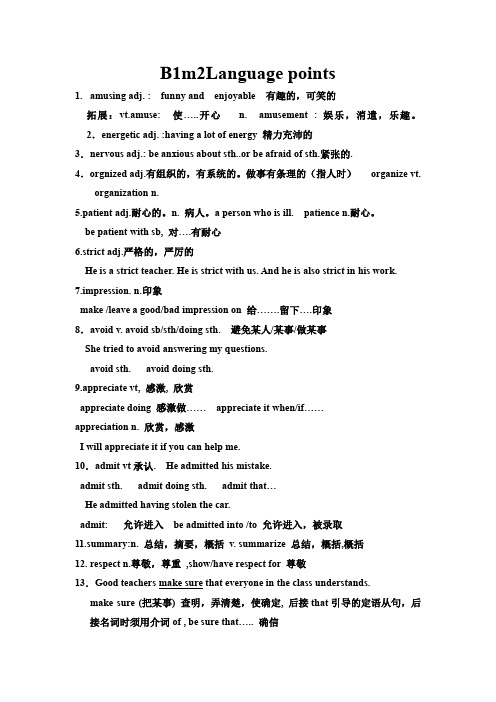
B1m2Language points1.amusing adj. : funny and enjoyable 有趣的,可笑的拓展:vt.amuse: 使…..开心n. amusement : 娱乐,消遣,乐趣。
2.energetic adj. :having a lot of energy 精力充沛的3.nervous adj.: be anxious about sth..or be afraid of sth.紧张的.4.orgnized adj.有组织的,有系统的。
做事有条理的(指人时)organize vt.organization n.5.patient adj.耐心的。
n. 病人。
a person who is ill. patience n.耐心。
be patient with sb, 对….有耐心6.strict adj.严格的,严厉的He is a strict teacher. He is strict with us. And he is also strict in his work.7.impression. n.印象make /leave a good/bad impression on 给…….留下….印象8.avoid v. avoid sb/sth/doing sth. 避免某人/某事/做某事She tried to avoid answering my questions.avoid sth. avoid doing sth.9.appreciate vt, 感激, 欣赏appreciate doing 感激做……appreciate it when/if……appreciation n. 欣赏,感激I will appreciate it if you can help me.10.admit vt承认. He admitted his mistake.admit sth. admit doing sth. a dmit that…He admitted having stolen the car.admit: 允许进入be admitted into /to 允许进入,被录取11.summary:n. 总结,摘要,概括v. summarize 总结,概括,概括12. respect n.尊敬,尊重,show/have respect for 尊敬13.Good teachers make sure that everyone in the class understands.make sure (把某事) 查明,弄清楚,使确定, 后接that引导的定语从句,后接名词时须用介词of , be sure that….. 确信14. Mrs. Li just smiles, so that you don’t feel co mpletely stupid.(1)so that, so ….that…因此引导结果状语从句:He spoke fast, so that I didn't catch him.He spoke so fast that I didn't catch him.(2)so that = in order that为了.引导目的状语从句He got up early so that/ in order that he could catch the first bus.(3) so … that ; such …that都引导结果状语从句。
(完整版)外研版高中英语必修一Module2_讲解及练习
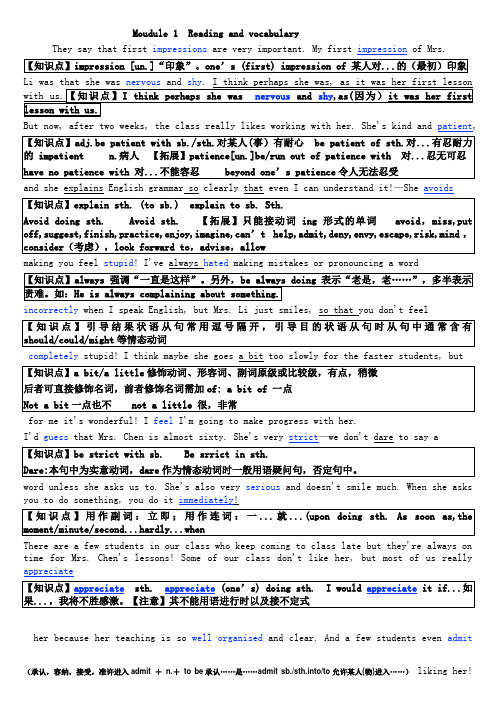
Moudule 1 Reading and vocabularyThey say that first impressions are very important. My first impression of Mrs.But now, after two weeks, the class really likes working with her. She's kind and patient,and she explains English grammar so clearly that even I can understand it!—She avoidsmaking you feel stupid! I've always hated making mistakes or pronouncing a wordincorrectly when I speak English, but Mrs. Li just smiles, so that you don't feelcompletely stupid! I think maybe she goes a bit too slowly for the faster students, butfor me it's wonderful! I feel I'm going to make progress with her.I'd guess that Mrs. Chen is almost sixty. She's very strict—we don't dare to say aword unless she asks us to. She's also very serious and doesn't smile much. When she asks you to do something, you do it immediately!There are a few students in our class who keep coming to class late but they're always on time for Mrs. Chen's lessons! Some of our class don't like her, but most of us really appreciateher because her teaching is so well organised and clear. And a few students even admit(承认,容纳,接受,准许进入admit +n.+to be承认……是……admit sb./sth.into/to允许某人(物)进入……)liking her!During scientific experiments, she explains exactly what is happening and as a result my work is improving. Physics will never be myMr. Wu's only been teaching us for two weeks and he's already very popular. I think this is because he really enjoys teaching Chinese literature—he loves it, in fact! He's got so much energy; this is one class you do not fall asleep in! He's about 28, I think, and is rather good-looking. He talks loudly and fast, and waves his hands about a lot when he gets excited. He's really amusing and tells jokes when he thinks we're getting bored. Even things like compositions and summaries are fun with Mr. Wu. I respect him a lot.2.He has____________(承认)that he did not finish his homework.3.He is____________(欣赏)by his boss because he has done his work well.4.After learning some passages,the teacher asked us to write two____________(总结).5.My beloved mother is always____________(精力充沛的)as though she never knows tiredness.6.Tom is a very____________(聪明的)boy.He often finds the solutions to some difficult problems.Ⅱ.选词填空summary;respect;appreciate;avoid;serious1.At the end of the news,they often give you a ____________ of the main news stories.2.I’d ____________ it if you let me get on with my job.3.Do you think Tim’s ____________ me?I haven’t seen him all day.4.Please don’t laugh—I’m being ____________.5.New teachers have to win the ____________ of their students.Ⅲ.单项填空1.Just be a little________.Soon you will find out what you want to know.A.serious B.Strict C.nervous D.patient2.Her parents put a lot of effort into getting her________to a key school.A.accepted B.Received C.announced D.admitted3.They told me it would be cheap but________it cost me nearly $500.A.in a word B.at last C.in fact D.as a result4.I have much respect ________teachers because they devote themselves to teaching.A.to B.For C.about D.towards5.Reading is________good habit.Stick to it,and you’ll make________great progress.A.a;/ B.a;a C.the;a D./;a6.With some books badly needed________,she hurried to the bookstore.A.buying B.Bought C.to buy D.buy7.I won’t call you,________something unexpected happens.A.unless B.Whether C.because D.while8.People appreciate________with him because he is knowledgeable and humorous.A.to talk B.Shouting C.to shout D.talking9.—Did you pack him some food?—Yes,________he wouldn’t get hungry.A.as soon as B.as a result C.so that D.in case10.He is a(n)________man.He can work more than 10 hours without rest.A.energetic B.Powerful C.lovely D.intelligentⅣ.阅读理解I arrived in the classroom,ready to share my knowledge and experience with 76 students who would be my English literature class.Having taught in the US for 17 years,I have no doubt about my ability to hold their attention and to impress on them my admiration for the literature of my mother tongue.I was shocked when the monitor shouted,“stand up!” The entire class rose as I entered the room and I was somewhat confused about how to get them to sit down again,but once the embarrassment was over,I quickly regained my calmness and admiration.I went back to my office with the rosy glow which came from a strong sense of achievement.My students kept diaries.However,as I read them,the rosy glow was gradually replaced by a strong sense of sadness.The first diary said,“Our literature teacher didn’t teach us anything today.Perhaps her next lecture will be better.”Greatly surprised,I read diary after diary,each expressing a similar theme.“Didn’t I teach them anything? I described the entire Western philosophy(哲学)and laid the historical background for all the works we will study in class,”I complained.“How should they say I didn’t teach them anything?”It was a long term,and it gradually became clear that my ideas about education were not the same as those of my students.I thought a teacher’s job was to raise in teresting questions and provide enough background so that students could draw their own conclusions.My students thought a teacher’s job was to provide exact information as directly and clearly as possible.What a difference!However,I also learned a lot, and the experience with my Chinese students has made me a better American teacher,knowing how to teach in a different culture.1.The writer wants to tell us through her experience that ________.A.Chinese students are hard to teach B.she has no-experience in teaching Chinese studentsC.Chinese students has made her a better American teacherD.different countries have different cultures even in teaching2.We can know that on the first day the writer ________.A.was disappointed at her students’ performan ce B.felt very confident about herself at firstC.felt she didn’t teach them much D.was very confident about her students3.At the beginning of the lesson,the writer got confused because of ________.A.cultural differences B.her own embarrassment C.students’ embarrassment D.students’ admiration 4.The writer learnt from their diaries that the students wanted to ________.A.raise interesting questions B.know more about backgroundC.draw their own conclusions D.know more about exact facts5.We can infer from the passage that ________.A.the writer doubted about her ability of teaching B.the writer is still teaching Western philosophy in China C.different cultures may require different teaching methodsD.the write r’s experience has made her return to her own countryⅤ.阅读表达What does work to get you around unfamiliar territory(不熟悉的地方)is a map.To use a map,you must be able to read it.If you want to use a map,here’s what you should do:First,find out which is north,south,east,and west.Next,look for the special signs and symbols(标志物) on themap.This_means_you_must_find_out_what_things_stand_for_other_things.For example,a red line usually stands for a main highway or freeway.A black line stands for a street,and a black line with little lines across it stands for a railroad.A blue line usually stands for a river.The size of cities is indicated(表示)by the size of a black dot.An airport is shown by a tiny plane.All this information explaining what the lines and s hapes stand for is given in the “legend”.It is called the legend because it tells the story of the map.The legend is usually found at the bottom of the map.Then,of course,in order to find your way,you must know where you are first.Mark this place on the map.Then,find the place on the map where you want to go and mark it.Now you can read the map to see what seems the best way to get to your destination(目的地).1.What is the main idea of the passage?(no more than 10 words)________________________________________________________________________2.What must you know before you can read a map?(no more than 10 words)________________________________________________________________________3.What is the legend in this passage?(no more than 10 words)________________________________________________________________________4.What stands for a railroad on a map?(no more than 10 words)________________________________________________________________________5.Translate the underlined sentence in the third paragraph into Chinese.________________________________________________________________________Moudule 2 Listening and vocabulary1.The soldiers showed perfect____________(纪律)under fire.2.I will be____________(轻松的)when I know you are safe.3.She was late and I____________(同样地)was delayed.4.The job does not require any____________(正式的)training.5.What is the____________(关系)between the man and the woman?6.Students sometimes take jobs during the ____________(假期).Ⅱ.选词填空be true of;take notes;come true;point at;would rather1.His dream of becoming a star ____________.2.It’s impolite of you to face people with your feet ____________them.3.The food is good and the same ____________ the service.4.The students are busy ____________ in class.5.I can come today but I ____________ come tomorrow.Ⅲ.单项填空1.—Shall we go to the exhibition in the museum this Sunday?—________.A.It’s up to you B.It’s by you C.It’s your turn D.It goes to you2.Our bodies are strengthened by taking exercise.________,our minds are developed by learning.A.Probably B.LikelyC.Similarly D.Generally3.Charles Babbage is generally considered________the first computer.A.to invent B.inventingC.to have invented D.having invented4.—Have you got any particular plans for the coming holiday?—Yes.________,I’m going to visit some homes for the old in the city.A.If ever B.If busyC.If anything D.If possible5.I wish you’d do ________ talking and some more work.Thus things will become better.A.a bit less B.any lessC.much more D.a little more6.I cannot go shopping with you because I have________things to do.A.a couple of B.the couple ofC.couples of D.a couple7.I thought her nice and honest ________ I met her.A.first time B.the first timeC.for the first time D.in time8.We will be shown around the city:schools,museums,and some other places,________ other visitors seldom go.A.what B.whichC.where D.when9.________either he or you going with me when the play________here?A.Is;is put on B.Is;is put upC.Are;is put on D.Are;put up10.—Do you mind if I open the windows?—________ I feel a bit cold.A.Of course not. B.I’d rather you didn’t.C.Go ahead. D.Why not?Ⅳ.完形填空While I studied at school,I had great difficulty in learning my Latin translations.I was always very__1__in using a dictionary,and__2__it most difficult,while to other boys it seemed no__3__.I formed an alliance(盟友)with a boy in the Sixth Grade.He was very clever and__4__read Latin as easily as English.My friend for his part was almost as__5__troubled by the English essays he had to write for the headmaster as I was__6__these Latin words.We agreed together that he could__7__me my Latin translations and1.A.quick B.slowC.hard D.good2.A.made B.gotC.found D.left3.A.trouble B.differenceC.labor D.worry4.A.might B.wouldC.should D.could5.A.very B.littleC.much D.few6.A.for B.byC.in D.to7.A.change B.takeC.forgive D.tellthat I should do his essays.The arrangement__8__wonderfully.The headmaster seemed quite__9__with my work,and I had more time to myself in the morning.On the other hand,once a week__10__I had to write the essays of my friend.For several months no difficulty__11__,but once we were nearly caught out.One afternoon,the headmaster__12__my frie nd to discuss one essay with him in a lively spirit.“I was interested in this__13__you make here.I think you might have gone further.Tell me__14__you had in your mind.”The headmaster continued in this__15__for some time to the fear of my friend.However,the headmaster,not wishing to__16__an occasion of praise into__17__of fault-finding,finally__18__him go.He came back to me like a man who had had a very narrow__19__and I made up my mind to make every effort to study my__20__.8.A.worked B.triedC.happened D.developed9.A.angry B.satisfiedC.frightened D.sad10.A.or so B.or elseC.as usual D.as far11.A.became B.seemedC.lay D.appeared12.A.called B.taughtC.arranged D.sent13.A.aim B.goalC.point D.opinion14.A.why B.howC.which D.what15.A.excitement B.wayC.meaning D.disappointment16.A.turn B.leaveC.grow D.become17.A.none B.oneC.either D.some18.A.ordered B.askedC.took D.let19.A.surprise B.escapeC.hope D.chance20.A.reading B.writingC.translations D.essaysⅤ.阅读理解Many years ago,when I was fresh out of school and working in Denver,I was driving to my parents’ home in Missouri for Christmas.I stopped at a gas station(加油站) about 50 miles from Oklahoma City,where I was planning to stop and visit a friend.While I was standing in line at the cash register(收款台),I said hello to an older couple who were also paying for gas.I took_off,but had gone only a few miles when black smoke poured from the back of my car.I stopped and wondered what I should do.A car pulled up behind me.It was the couple I had spoken to at the gas station.They said they would take me to my friend’s.We chatted on the way into the city,and when I got out of the car,the husband gave me his business card.I wrote him and his wife a thank-you note for helping me.Soon afterward,I received a Christmas present from them.Their note that came with it said that helping me had made their holidays meaningful.Years later,I drove to a meeting in a nearby town in the morning.In late afternoon I returned to my car and found that I’d left the lights on all day,and the battery(电池)was dead.Then I noticed that the Friendly Ford dealership—a shop selling cars—was right next door.I walked over and found two salesmen in the showroom.“Just how friendly is Friendly Ford?” I asked and explained my trouble.They quickly drove a pickup truck to my car and started it.They would accept no payment,so when I got home,I wrote them a note to say thanks.I received a letter back from one of the salesmen.No one had ever taken the time to write him and say thank you,and it meant a lot,he said.“Thank you ”—two powerful words.They’re easy to say and mean so much.1.The author planned to stop at Oklahoma City to ________.A.visit a friendB.see his parentsC.pay for the cash registerD.have more gas for his car2.The word s “took off” underlined in Paragraph 2 mean“________”.A.turned off B.moved offC.put up D.set up3.What happened when the author found smoke coming out of his car?A.He had it pulled back to the gas station.B.The couple sent him a business card.C.The couple offered to help him.D.He called his friend for help.4.The battery of the author’s car was dead because ______.A.something went wrong with the lightsB.the meeting lasted a whole dayC.he forgot to turn off the lightsD.he drove too long a distance5.By telling his own experiences,the author tries to show ________.A.how to write a thank-you letterB.how to deal with car problemsC.the kind-heartedness of older peopleD.the importance of expressing thanks。
外研版高中英语必修一单词Module-2详解

Module 2amusing [ə'mju:ziŋ] adj. 有趣的;可笑的amused adj. sb be ~withamuse v. ~oneself with sth 自娱自乐amusement n. to one's ~energetic [,enə'dʒetik] adj. 精力充沛的energey n精力,能量;intelligent [in'telidʒənt] adj. 聪明的intelligence n.nervous ['nə:vəs] adj.紧张的;焦虑的be ~about/ofnerve n. 神经nervously adv.$nervousness n.organized ['ɒ:gənaizd] adj.有组织的;有系统的organize v.organization n.patient ['peiʃənt] adj.耐心的be ~ with反impatient《patience/impatiencepatient n.病人patients pl.serious ['siəriəs] adj. 严肃的,严重的be ~ aboutseriously adv.seriousness n.shy [ʃai] adj.害羞的;羞怯的be~of*strict [strikt] a. 严格的;严厉的be~with sb; be~about sthstrictness n.impression [im'preʃən] n. 印象impress v. ~sb with sth;~sth on sb impressive adj.(avoid [ə'vɒid] vt.(故意)避开~doing avoidable adj. unavoidable adj. avoidance n.hate [heit] vt.讨厌;不喜欢~doing/to do hateful adj 可恶的—incorrectly [,inkə'rektli] adv.不正确地incorrect adjcorrect v./adj.correction n.completely [kəm'pli:tli] adv. 十分地;完全地complete v.完成adj. 十分的】immediately [i'mi:diətli] adv.立即;即刻immediate adj 立即,马上immediateness n.appreciate [ə'pri:ʃieit] vt.感激~doing appreciation n.appreciative adj.有鉴赏力的,感激的"admit [əd'mit] vt. 承认~doing admitted 公认的,准许进入的scientific [,saiən'tifik] adj. 科学的science n.scientist n.literature ['litərətʃə] n. 文学Chinese ~(literary adj.文学的literate n. 识字的人,受过教育的人loudly ['laudli] adv. 大声地(喧闹)aloud adv.(声高) cry,shout read~loud adj.loudness n.》wave [weiv] vt.挥(手);招(手)~atn. 波浪make waves 惹是生非,兴风作浪joke [dʒəuk] n. 玩笑;笑话make a joke/ play a joke on sb.just be joking.summary ['sʌməri] n.总结;摘要;提要in~ |respect [ri'spekt] vt.&n.尊敬;尊重~forin one ~一方面; in ~of 涉及respectful adj. 有礼貌的,表示尊敬的respectable adj. 值得尊敬的respective adj.分别的grade [greid] n.(美)成绩;分数¥headmaster ['hed'mɑ:stə] n.校长headmistress ['hed'mistris] n.女校长period ['piəriəd] n.一段时间 a short ~ of timerevision [ri'viʒən] n.复习do some ~revise v.。
外研版必修一module2知识点共35页
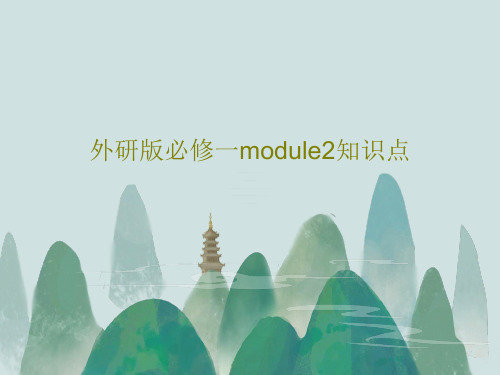
END
16、业余生活要有意义,不要越轨。——华盛顿 17、一个人即使已登上顶峰,也仍要自强不息。——罗素·贝克 18、最大的挑战和突破在于用人,而用人最大的突破在于信任人。——马云 19、自己活着,就是为了使别人过得更美好。——雷锋 20、要掌握书,莫被书掌握;要为生而51、没有哪个社会可以制订一部永远 适用的 宪法, 甚至一 条永远 适用的 法律。 ——杰 斐逊 52、法律源于人的自卫本能。——英 格索尔
53、人们通常会发现,法律就是这样 一种的 网,触 犯法律 的人, 小的可 以穿网 而过, 大的可 以破网 而出, 只有中 等的才 会坠入 网中。 ——申 斯通 54、法律就是法律它是一座雄伟的大 夏,庇 护着我 们大家 ;它的 每一块 砖石都 垒在另 一块砖 石上。 ——高 尔斯华 绥 55、今天的法律未必明天仍是法律。 ——罗·伯顿
外研社版高中英语必修一 Module 2 基础知识总结
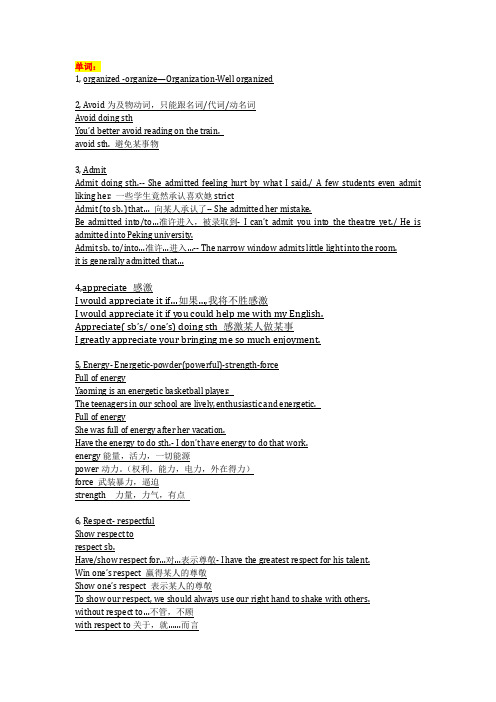
单词:1, organized -organize—Organization-Well organized2, Avoid为及物动词,只能跟名词/代词/动名词Avoid doing sthYou’d better avoid reading on the train.avoid sth. 避免某事物3, AdmitAdmit doing sth.--She admitted feeling hurt by what I said./ A few students even admit liking her. 一些学生竟然承认喜欢她strictAdmit (to sb. )that… 向某人承认了-- She admitted her mistake.Be admitted into/to…准许进入,被录取到-I can’t admit you into the theatre yet./ He is admitted into Peking university.Admit sb. to/into…准许…进入…-- The narrow window admits little light into the room.it is generally admitted that…4,appreciate 感激I would appreciate it if…如果…,我将不胜感激I would appreciate it if you could help me with my English.Appreciate( sb’s/ one’s) doing sth 感激某人做某事I greatly appreciate your bringing me so much enjoyment.5, Energy- Energetic-powder(powerful)-strength-forceFull of energyYaoming is an energetic basketball player.The teenagers in our school are lively, enthusiastic and energetic.Full of energyShe was full of energy after her vacation.Have the energy to do sth.- I don’t have energy to do that work.energy能量,活力,一切能源power动力。
- 1、下载文档前请自行甄别文档内容的完整性,平台不提供额外的编辑、内容补充、找答案等附加服务。
- 2、"仅部分预览"的文档,不可在线预览部分如存在完整性等问题,可反馈申请退款(可完整预览的文档不适用该条件!)。
- 3、如文档侵犯您的权益,请联系客服反馈,我们会尽快为您处理(人工客服工作时间:9:00-18:30)。
Module 2
amusing [ə'mju:ziŋ] adj. 有趣的;可笑的amused adj. sb be ~with
amuse v. ~oneself with sth 自娱自乐amusement n. to one's ~
energetic [,enə'dʒetik] adj. 精力充沛的energey n精力,能量
intelligent [in'telidʒənt] adj. 聪明的intelligence n.
nervous ['nə:vəs] adj.紧张的;焦虑的
be ~about/of
nerve n. 神经
nervously adv.
nervousness n.
organized ['ɒ:gənaizd] adj.有组织的;有系统的
organize v.
organization n.
patient ['peiʃənt] adj.耐心的be ~ with
反impatient
patience/impatience
patient n.病人patients pl.
serious ['siəriəs] adj. 严肃的,严重的be ~ about
seriously adv.
seriousness n.
shy [ʃai] adj.害羞的;羞怯的be~of
strict [strikt] a. 严格的;严厉的
be~with sb; be~about sth
strictness n.
impression [im'preʃən] n. 印象
impress v. ~sb with sth;~sth on sb impressive adj.
avoid [ə'vɒid] vt.(故意)避开~doing avoidable adj. unavoidable adj. avoidance n.
hate [heit] vt.讨厌;不喜欢~doing/to do hateful adj 可恶的
incorrectly [,inkə'rektli] adv.不正确地incorrect adj
correct v./adj.
correction n.
completely [kəm'pli:tli] adv. 十分地;完全地complete v.完成adj. 十分的
immediately [i'mi:diətli] adv.立即;即刻immediate adj 立即,马上immediateness n.
appreciate [ə'pri:ʃieit] vt.感激~doing appreciation n.
appreciative adj.有鉴赏力的,感激的
admit [əd'mit] vt. 承认~doing
admitted 公认的,准许进入的
scientific [,saiən'tifik] adj. 科学的
science n.
scientist n.
literature ['litərətʃə] n. 文学Chinese ~ literary adj.文学的
literate n. 识字的人,受过教育的人
loudly ['laudli] adv. 大声地(喧闹)
aloud adv.(声高) cry,shout read~
loud adj.
loudness n.
wave [weiv] vt.挥(手);招(手)~at
n. 波浪make waves 惹是生非,兴风作浪
joke [dʒəuk] n. 玩笑;笑话
make a joke/ play a joke on sb.
just be joking.
summary ['sʌməri] n.总结;摘要;提要in~
respect [ri'spekt] vt.&n.尊敬;尊重~for
in one ~一方面; in ~of 涉及
respectful adj. 有礼貌的,表示尊敬的respectable adj. 值得尊敬的
respective adj.分别的
grade [greid] n.(美)成绩;分数
headmaster ['hed'mɑ:stə] n.校长headmistress ['hed'mistris] n.女校长
period ['piəriəd] n.一段时间 a short ~ of time
revision [ri'viʒən] n.复习do some ~
revise v.
translation [træns'leiʃən] n. 翻译
translate v.
translator n.
timetable ['taimteibl] n. 时间表
topic ['tɒpik] n.话题;题目
vacation [vei'keiʃən] n. 假期take a~/be on~
revise [ri'vaiz] vt.温习(功课)
discipline ['disiplin] n.纪律
disciplined adj. 有纪律的,受过训练的
relationship [ri'leiʃənʃip] n. 关系
relate v. 相关
related to 与……相关
relative adj. 相对的。
n. 亲属
formal ['fɒ:məl] adj. 正式的
informal adj. 非正式的
relaxed [ri'lækst] adj.轻松的;松懈的;宽松的
relaxing
relax v. ~ oneself
similarly ['similəli] adv.同样地,类似地similar adj. be ~to
similarity n.。
